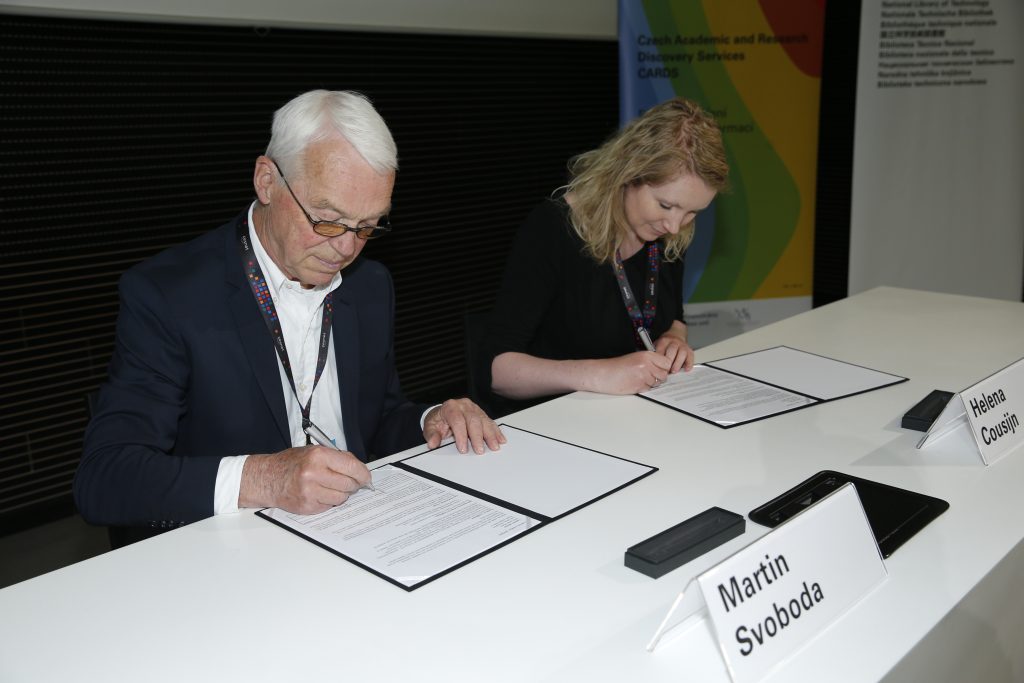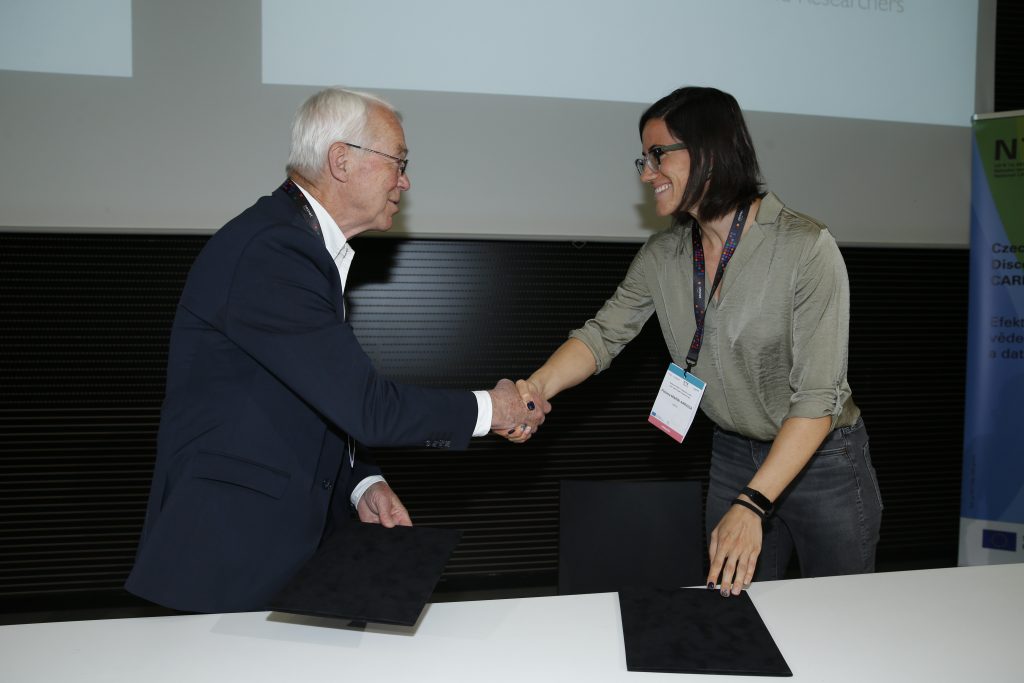The newly established National ORCID and DOI Centres will help Czech researchers to use persistent identifiers to tackle bureaucracy and promote process efficiency within research organisations.
On 1 June 2023, two new National Centres were established at the National Library of Technology in Prague – the National ORCID Centre (NC ORCID) and the National DOI Centre (NC DOI). They will support Czech scientists in the use of persistent identifiers ORCID and DOI. These are persistent electronic codes used to uniquely identify people and objects (e.g. articles or datasets) in digital space.
Both centres will operate under the auspices of the National Library of Technology (NTK) and will offer Czech research institutions access to services that can streamline their internal processes and reduce the administrative burden on researchers.
The establishment of both centres was supported by the IPs CARDS (Czech Academic and Research Discovery Services) project from theJohannes Amos Comenius Operational Programme. The main objective of the IPs CARDS project is to create a central platform for managing all types of information resources for Czech research organisations.
Martin Svoboda, Director of NTK, formally confirmed the establishment of both centres by signing on behalf of the National Library of Technology and noted: “I am glad that thanks to the CARDS project, we can now offer Czech research and academic institutions not only methodological but also financial support for their wider use through new centres. We believe that this support will lead in the long term to an increase in the efficiency of the Czech R&D&I ecosystem and we look forward to mutual inspiration with the international community around ORCID and DataCite.”

The signing took place during the international conference National EOSC Tripartite Event, which was also attended by Helena Langšádlová, Minister for Science, Research and Innovation, Václav Velčovský, Director General of the International Relations, EU and ESIF Section of the Ministry of Education and Science, and Jiří Homola, Vice-Chairman of the Council for Research, Development and Innovation.
The use of persistent identifiers is also supported by the European Commission and it is already standard in the current Horizon Europe framework programme for research, development and innovation, which will distribute €95.5 billion between 2021 and 2027.
Less administrative burden for scientists and research organisations
The ORCID iD (“Open Researcher and Contributor Identifier”) is an internationally recognized, unique combination of numbers used to permanently identify all persons involved in the research and publication processes in science and is based on an ISO standard (ISO 27729:2012 Information and documentation – International standard name identifier (ISNI)).
Researchers can use this identifier to clearly link their publications, research data and other outputs of the research process, such as patents, software or new methodologies to themselves. Researchers manage their identifier as their own individual profile, over which they have full control at all times. In addition to their titles and academic ranks, they can also indicate grants or special awards, medals, etc. It is entirely up to them what information they wish to disclose and to whom it should be made available.
In practice, this means that scientists do not have to worry about the negative consequences of changing their name or having their name listed in different ways when searching for scientific publications of which they are authors. Another advantage is that the use of ORCID saves scientists time, for example, when filling out lengthy applications for grant competitions. In many cases it will not be necessary to fill in the applications with publications or a CV. Instead, it will only be possible to insert a unique ORCID identifier, which will allow the evaluating institutions to learn verified information about the professional profile of the authors of the application and their research team.
Further benefits for researchers can be gained by integrating ORCIDs into the systems of research organisations (e.g. repositories or CRIS systems). This will enable more efficient collection of data on the scientific activities of individual researchers and, as a result, ease the administrative burden on both the researchers themselves and their home organisations.
The new National ORCID Centre will provide Czech research organisations with financial and methodological support to access the full functionality of ORCID premium membership between 2023 and 2028, enabling them to work more efficiently with ORCID iD and integrate it into their internal systems.
As of 1 June, 18 institutions have started using the services of the National ORCID Centre – 15 universities, as well as the Czech Science foundation (GAČR), the CESNET association and the NTK, which will not only coordinate the National ORCID Centre but will also integrate ORCID into their systems like the other participating organisations. Other institutions will join gradually in the following years.
“We are thrilled to welcome the Czech National Consortium [National ORCID Centre] to ORCID. With the support of the National Library of Technology, we are confident that the Czech research community will achieve exceptional participation and adoption of ORCID, bringing greater visibility to Czech researchers, helping them claim credit for their work, and reducing administrative burden. We look forward to working with the Czech Republic to promote ORCID best practices and wider persistent identifier adoption to maximize the value for both the national and international research communities,” says Chris Shillum, CEO of ORCID.

Always findable information resources
A new National DOI Center was established at the same time as the National ORCID Center. This centre will focus on supporting effective implementation and use of the DOI persistent identifier.
Relatively well known among the scientific community, the DOI (Digital Object Identifier) serves as the most widely used object identifier in the digital environment. The term “object” refers to, for example, scientific articles, research data and other outputs of scientific work. The DOI makes these objects uniquely identifiable, traceable and easily citable.
Along with the unique DOI code, metadata (other identifying information) about the output is also stored. If the article or research data you are looking for moves to another location for any reason, the DOI can still be used to find it.
The National DOI Center will provide a range of services to its members. During 2023 to 2028, it will cover the financial cost of assigning DOIs through DataCite, the agency that provides registration of these unique identifiers. But in addition, it will also offer methodological support, sharing of good practice and support with basic technical problems with DOI allocation. All universities and research and non-profit organisations active in research, development and innovation in the Czech Republic will have the opportunity to become members of the new national centre.
The services of the National Centre have been used by seven institutions since 1 June – three universities, the Library of the Czech Academy of Sciences and two other institutes of the CAS, as well as the NTK, which will not only coordinate the National DOI Centre but will also allocate DOIs in its institutional repository. Other institutions can join to use the services at any time during this year and the following years.
“We are thrilled to welcome the National Library of Technology (NTK), Czech Republic, as the coordinator of a new DataCite Consortium [National DOI Center]. The partnership strengthens our global community and enhances our mission of enabling persistent and reliable access to research outputs and resources globally,” says Matthew Buys, Director of DataCite.
National Technical Library
The National Technical Library is the largest and oldest library of technical literature in the Czech Republic. In a modern building in the centre of the Dejvice Campus, it offers key information resources, quality services and generous space for study and teamwork. It also functions as a social centre with a gallery, café and conference hall.
ORCID
ORCID’s core vision is a world in which everyone involved in research, development and innovation is identified using a unique code, linking them to their research and their own contribution to world science.
ORCID aims to resolve ambiguity in the names of researchers and academics, thereby reducing the administrative burden on researchers, eliminating errors in the entry of names in different systems, and helping research organisations to effectively record the impact of the research they produce or fund. To this end, it provides a unique ORCID iD identifier that individuals can use alongside their name when engaging in research and innovation activities. In addition, this identifier also allows them to make transparent and trusted connections between researchers.
DataCite
DataCite is the world’s leading non-profit organization that provides persistent DOI object identifiers for research data and other research results. DataCite’s goal is to help the research community to locate, identify and reliably cite research data and other digital objects. The use of DOIs significantly helps to maintain the long-term traceability of objects or at least basic information about them.